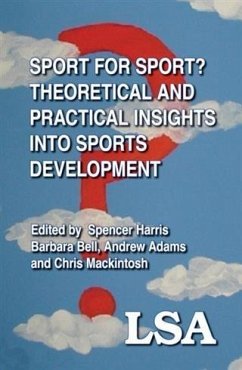This backdrop of legitimacy, viability and coherence to and of sport development sets the tone for many of the presentations at the symposium and certainly connects the papers presented in this volume. The challenge of the symposium to bring academic and practitioners together is also reflected in the chapters presented here. Each brings elements of translation from theory to practice and should allow not only for reflection on professional practice, but also for closer synergies between academics and practitioners. In so doing, this volume addresses a concern voiced by Barrie Houlihan (2011) that that academics are not doing enough to narrow the gap between researchers and research users. This volume makes a significant contribution to that agenda.
In the first chapter Kevin Hylton and Hazel Hartley discuss sports development as a profession. They argue that whilst sports development may claim to be a profession, on closer inspection it fails to meet a number of criteria commonly attached to professions - for example a common or agreed definition, a unifying body, any enforceable entry requirements, an ethical code, and has no powers of exclusion or restrictions of practice.
Lesley Philpott and Jonathan Grix explore the increasing politicisation of physical education (PE) and youth sport policy with a focus on the School Club Links work strand of the UK Government's 'Physical Education and Sport Strategy for Young People' (PESSYP).
Steve Bullough, Gemma Hart, Richard Moore and Stuart Bonner presenting a number of key issues emanating from their evaluation of the Sport Unlimited programme and emphasise the importance of the 'student voice' in designing and developing school-based sports.
Alex Stewart explores the relationship between the cultural production of amateur boxing and the aims of sports development as a process of personal and social change. His paper provides an example of the utility of sociological theory to sports development practice.
Aaron Beacom examines the tension between the city and state as stakeholders in the bidding for Olympic and Paralympic Games and argues that multi-stakeholder diplomacy can provide a useful lens through which to view the dynamics of state and sub-state diplomacy in relation to the Olympic and Paralympic Games.
Chris Mackintosh examines the shifting dynamics of public sector sports development and sets out to identify the range and nature of challenges that face public sector sports development practitioners. He points to an ongoing tension between pure sports development and sport-for-development objectives.
Leona Trimble investigates the issue of women's leadership via a coaching project in South Africa and examines some of the possibilities of sport and policy aimed at using sport as an agent of change. She presents some critical discussion of the limitations and fallibility of such approaches.
Dieser Download kann aus rechtlichen Gründen nur mit Rechnungsadresse in A, B, BG, CY, CZ, D, DK, EW, E, FIN, F, GR, HR, H, IRL, I, LT, L, LR, M, NL, PL, P, R, S, SLO, SK ausgeliefert werden.









